Lagos, a city to experience
Anja Sijben lives and works in Amsterdam. She is fascinated by people's reflection on their own thinking and attitudes. In November/December 2017 she will participate in the art community festival ICAFlagos2017 in Lagos, Nigeria. She visualizes values of residents in the Iwaya neighborhood, in order to make people really connect with each other.

Lagos, a city in Nigeria with a population of 21 million. Every day 2,000 new people arrive, about 600,000 per year. A city of extremes. On the one hand, a small group of Nigerians with lots of money and luxury (often from the former rich tribes), with their own staff and still a house in London, where their children study. On the other hand, people live in slums, with communal toilets made of corrugated iron a meter above the ground, where the excrement goes directly into the river or open sewer. Tribes from Benin come here to escape poverty, but end up in the same conditions here. My stay in Iwaya, where Lagos once originated, is close to the slums.
Lagos, a city in development. In addition to the popular music and nollywood scene, the visual arts are alive and well. In November there is an international art biennial, an art fair and an international photography festival in the upscale part of town. I see a lot of performance art, poets, photographers and video art. In their work I feel the primal power in storytelling.
Aderemie Adegbite, the organizer of the ICAFlagos2017 festival, lives in Iwaya. He wants to introduce people to art precisely in this poor neighborhood. It is his second festival, and the first time with residencies. He has invited Moran Been-Noon from Ireland and Aline Motta from Brazil and me. We are all staying in Iwaya, so as to experience real life on the ground.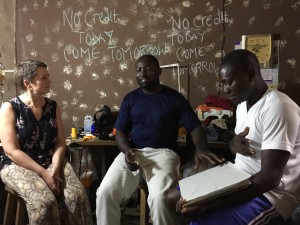
I live in a 4-room apartment, with a family of twelve. The lady of the house has given up her bedroom and bathroom to me for a month. There is one large blunt knife in the house, one gas stove, no scissors and no books. For much of the day there is no running cold water or electricity, a challenge for anyone. Most of the other houses in the neighborhood do not have toilets in the house, but a common shack in the courtyard where you can clean yourself, with water from the well, after your need. This shack is also the shower. The smell and the noise is strikingly different than in the Netherlands. Nearby sawmills burn their waste sawdust day and night. Shouting cab men, salesmen, the blaring prayer of the mosques at 5 a.m.; I live right in the middle of it.
Our introduction
Aderemi Adegbite shows us Lagos. In the slums and visiting famous musicians, artists and advertisers in the arts. We go to music and art performances. We are also guests on radio programs to tout our projects and the festival. Lagos is, as local photographer Uche James Rhoda says, not a city of pretty pictures, but a city to experience and meet.
My project
My project examines values in the neighborhood: caring, humble, hard working, open, innovative. Words that are not often talked about, but that move people. They can connect cultures. I make the words recur in the streets, visible to everyone.
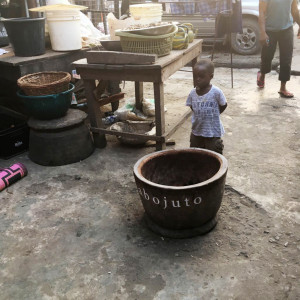 In three workshops, I collected the words. They are answers to the question "Who is your great example in this neighborhood, and why?" The why are people's values. What do they consider important? Aderemi introduces the workshops in the context of the festival. He supports people for whom English is difficult, or at all cannot write. The first workshop, three days after my arrival, is with housewives who meet weekly to discuss their ideas. The workshop takes place in the living room of our house. The second workshop is with the men of a t-shirt factory. In their 16 m2 workspace with five sewing machines, among the piles of garments, they think about and tell each other their important values. The third workshop is in the slums, a place on the street where the fishermen play a game every day. In between the shouts of the men, and the children who come curiously to us, I tell the purpose of the workshop and we collect their words.
In three workshops, I collected the words. They are answers to the question "Who is your great example in this neighborhood, and why?" The why are people's values. What do they consider important? Aderemi introduces the workshops in the context of the festival. He supports people for whom English is difficult, or at all cannot write. The first workshop, three days after my arrival, is with housewives who meet weekly to discuss their ideas. The workshop takes place in the living room of our house. The second workshop is with the men of a t-shirt factory. In their 16 m2 workspace with five sewing machines, among the piles of garments, they think about and tell each other their important values. The third workshop is in the slums, a place on the street where the fishermen play a game every day. In between the shouts of the men, and the children who come curiously to us, I tell the purpose of the workshop and we collect their words.
With these words, I get to work. They appear on meeting places, such as a bridge, benches and stools, where people talk to each other. I have also pasted words on touktoeks. Using words, sayings and advertisements on these "cabs" is very common here.
I have some words translated into Egun, the language in the slums, and into Yoruba, the language of the original inhabitants in this region. The translation of creative and innovative don't know them in the Egun. Calm, humble or godfearing do not know individual words, but only descriptions.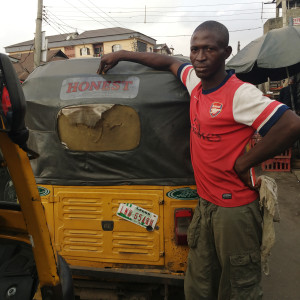
The words spark conversation. What does caring for someone? Can she or he give an example of this? What behaviors go with that? One participant told us that caring fits his friend, because he is always there for everyone. Talking about these words can give more insight and solutions in conflicts.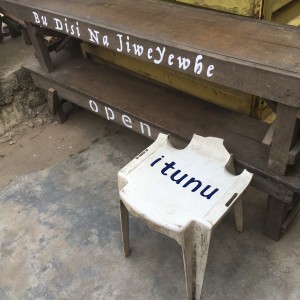
Implementation
The first word curious is planned for the wooden bridge and is made of collected waste wood, fabric and plastic, inspired by the houses in the slum. I am working with the local carpenter Tosi. His workshop is on the ground in a covered area where people watch soccer at night. After some confusion about the construction of the letters, I take him to the bridge to determine the height of the letters. There he sees how to attach the letters. After that, things go very quickly; and in three to four hours curious ready. Brave follows a few days later, for the second bridge. Ten days before the opening of the festival, after a heavy rain, the bridges "disappeared. The plants in the water have pushed the bridges over. Now we make the trip across the black dirty water in wooden boats; on the other side we discuss with the locals an alternative place for my words.
After many days of delay and no worries helps the organizer, two days before the festival, to get permission to place the wooden letters on the buildings. The operation wooden letters can start! We arrange a garbage cart to transport the letters, then via boats to the other side, and Tosi can get to work. Moran takes pictures along the bank and indicates whether the letters are hanging straight. Many children around her shout with her.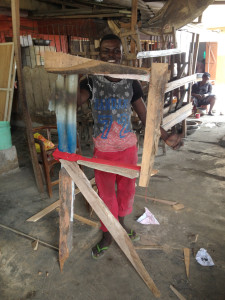
The words on the benches and stools, after much patience and good meticulous work by the graphic artist Jeje, were finished in time, on the day before the festival. I formed groups of words. At an outdoor card club, the words are: jovial, hardworking and tricky. Another play area: open, calm (itunu) and godfearing (Bu Disi Na Jiweyewhe) and at a canteen the words inventive, caring (abojuto) and humble. At this canteen there is also a place for a carpenter, a cobbler, a butcher, a football-watching place, a laundry, a nursery for children of the workers and a small place every evening for teaching the Koran to the children. That to me is inventive. As opposed to the little stores that all sell about the same thing. The stool with the word tricky has barely seen the light of day; the occupant was afraid it might get away and immediately put it in her house.
As the third element of the project, I had words printed as stickers. The words on the toektoeks (kekes here called) are eagerly received after the first driver is convinced. They will be driving around for months to come, getting the many road users to start a conversation about the words attentive, open, quiet, honest, talkative, playfull.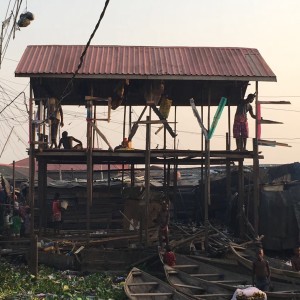
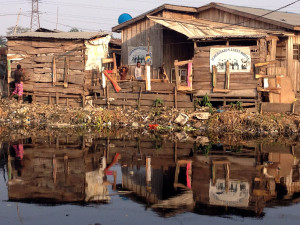
The Festival
Eighty artists are participating in the five-day ICAFlagos2017 festival. The representative of the Dutch Embassy, which supports the project, is also visiting. Throughout the streets there are photographs and drawings. There are performances, and video projections spontaneously visible in the neighborhood. During the festival, I lead visitors past my works. Locals are engaged with the words, proudly standing with them or wondering what they mean, discussions ensue. On the last day, I attend a very interesting lecture by a group of young Nigerian artists invisible borders. Glad I met them. They also find my work interesting. Maybe we can work together in the future.
The photos of my work were taken by Moran Been-Noon. And of course I thank all the people on the ground for staying and realizing my work in Lagos, especially: Aderemi, Jamiu, Tosin, Jeje, Soij, Aline, Abraham, Michel and Ahlaja.


